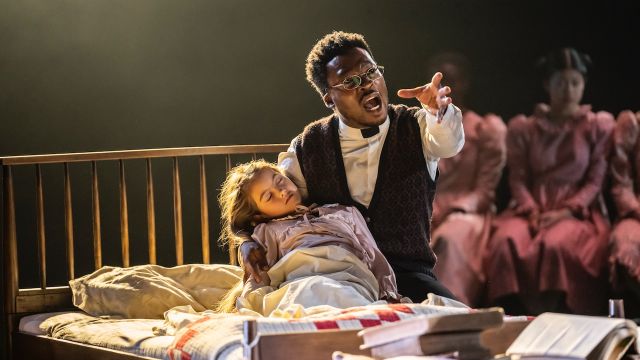The Crucible
For most of today’s audiences, terms such as God, the Devil, salvation, witches don’t have much credibility or substance. Yet they are used with dangerous certainty by the characters in Arthur Miller’s 1953 play. For them, all these things are without question real. For most of today’s audiences, the parallel with ‘McCarthyism’ too may well be unknown. So why is The Crucible, in this excellent, sustained production, still so gripping, so frightening, and even so plausible?
It's because, surely, those terms are a kind of code, and we recognise all too well the emotional and political situation on stage. The specifics are dated, the dynamics are not. ‘God’, the ‘Devil’, ‘Witches’ were the words that were used by the theocratic rulers, by the bullies, their victims, the opportunists and the fearful in the ‘Salem witch trials’ of 1692-3.
The isolated Puritans of the Massachusetts Bay Colony, clinging on the edge of a vast unknown wilderness, fearful of and subject to attack by hostile natives, but at the same time attempting to create a new, pure ‘religion’, with authority coming always from above, patriarchal, sexuality suppressed, needed cohesion and control. Religion was the way to punish and to exclude, and to maintain power.

But Miller goes well beyond a binary scenario of rulers and victims. The catalyst is a past affair between rough-edged farmer John Proctor (Brendan Cowell) and his one-time maid, Abigail Williams (Erin Doherty), still in love with Proctor. Doherty is riveting: she gives Abigail layers of character all at once: desperate, frightened, crazy, yet with flashes of tenderness. Caught dancing naked in the woods with other young women, while attempting to lay a curse on Proctor’s wife Elizabeth Proctor (Eileen Walsh), she evades condemnation by claiming to be possessed by the Devil. The troop of young women all obediently follow her lead.
Investigations and a trial ensue. A hard-line specialist in witchcraft and possession, Reverend John Hale (Fisayo Akinade) arrives to apportion blame. Scores are settled. Thomas Putnam (Alastair Parker), richest man in the colony, accuses his neighbour Giles Corey (Karl Johnson) of witchcraft in order to take his land from under him. Anne Putnam (Zoe Aldrich) now ‘realises’ her midwife, Goodie Nurse (Tilly Tremayne) is responsible for the death of her seven babies.
There are historical parallels. To take just one: Occupied France where scores could be settled by informing on a neighbour, or you could that shop or farm you always wanted by an accusation that someone was a Jew or in the Resistance.

The sense of oppression, of there being no way out, is bolstered by Lyndsey Turner’s direction: those being charged, interrogated, inspected or indeed resisting are surrounded by their accusers in images of converging lines like cages. When the Reverend Hale and Reverend Parris (Nick Fletcher) begin to doubt their own dogmatism, they are relegated up stage, lessened figures behind Deputy Governor Danforth (Matthew Marsh), the driving antagonist of Act II, and Judge Hathorne (Henry Everett).
The crushing repression is powerfully suggested by Es Devlin’s low ceiling set design and Tim Lutkin’s lighting in which, on all sides, there is an outer darkness. Tingying Dong’s and Paul Arditti’s sound design reinforces the sense of dread without ever being obtrusive. Caroline Shaw’s use of hymns in her compositions is both eerie and ironic. ‘Innocence’ becomes evil by force of circumstance.
As last year’s production here in Melbourne (and to be revived in June) of Miller’s Death of a Salesman proved, sensitive direction and a cast who get inside the text demonstrate that Miller’s long, wordy and often humourless plays can grab the audience by the throat. His analysis of situation and motive – always in the name of justice - is precise and revealing. The Crucible remains a powerful work that is both particular in detail and universal. Plus ça change…
Michael Brindley
Photographer: Johan Persson
Subscribe to our E-Newsletter, buy our latest print edition or find a Performing Arts book at Book Nook.

